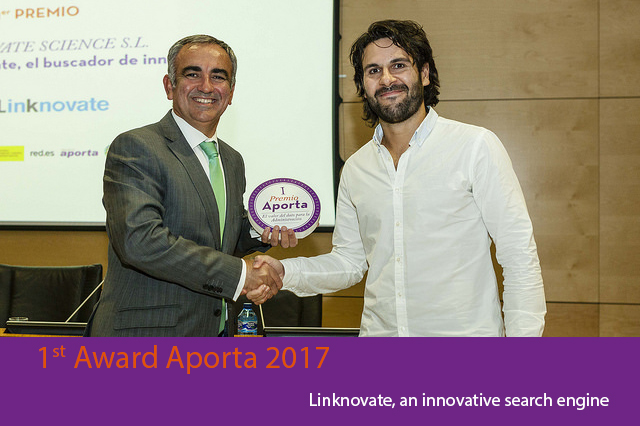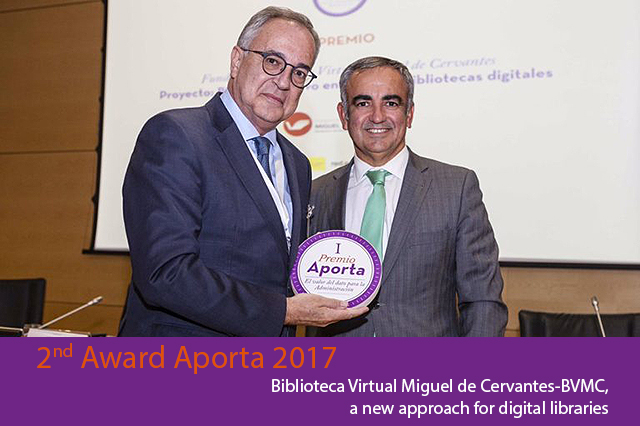The innovative search engine Linknovate and the virtual library Biblioteca Virtual Miguel de Cervantes have been the two winning projects of the first edition of the Aporta Awards 2017. An initiative promoted by the Secretary of State for the Information Society, Red.es and the General Secretariat of the Digital Administration with the aim of recognizing and disseminating innovative projects developed with public data and to which, in this first edition, 15 candidatures have been submitted. The awards took place on October 24, as the final highlight of the Encuentro Aporta 2017 that in this edition brought together national and international experts in open data under the claim "The value of data in the global ecosystem".


Linknovate, an innovative search engine
Innovative tool oriented to the business sector and focused on helping the search of business data (B2B) efficiently and easily, in a way that favors competitive intelligence and innovation. It is the largest database of science and technology entities, with more than 20 million references (single documents) and more than 2.3 million unique indexed entities (companies and research groups). The data is obtained from open scientific documents (scientific publications, conference proceedings, grants, ...), industrial documents (patents, trademarks, news, corporate websites) and unique information from direct contact with experts. It is as easy to use as a search engine but it provides a discovery experience and facilitates the interpretation of the found data. In the words of Manuel Noya, founding partner and CEO of Linknovate (in the upper left picture), "it is a business intelligence tool with which we help companies to better understand the technologies and emerging markets. But not only that, lso the structuring of data, its visualization, the new technologies and the key players that are behind these new technologies such as internet of things, cybersecurity, virtual reality ... etc ".
Manuel Noya, CEO of Linknovate: "We have developed a competitive intelligence tool and we help companies to better understand emerging technologies and markets, the structuring of data and its visualization, and we value a type of data with a social component very important which can advance science in a faster way ".
Linknovate works, fundamentally, in competitive intelligence to understand what its competitors are doing and, above all, to identify partners: research groups or companies of interest to reach agreements. "What makes us peculiar," adds Manuel Noya, "is that we value a type of data that has a very important social component which can advance science in a faster way, help companies to have more visibility and connect more easily with each others. " "In the end," concludes Noya, "we help companies not to re-invent the wheel and have a good map of who does what before launching a new product."
Biblioteca Virtual Miguel de Cervantes-BVMC, a new approach of virtual libraries
Developed by the Fundación Biblioteca Virtual Miguel de Cervantes, the main objective of data.cervantesvirtual.com is to improve the data quality, access and reuse of its funds, based on internationally recognized standards aimed at digital environments such as RDA. With a dynamic approach and constant open innovation, it seeks to improve the user experience and also promote the use of open data by the community, participating in congresses and publishing in scientific journals.
Manuel Bravo, general director of the Miguel de Cervantes Virtual Foundation: "our virtual library is the pioneering project in digital libraries, we started to share and create a library on the Internet, accessible to all, and with a collaborative approach from the start. BVMC is now a reference space that brings together technology and humanities. "
Data.cervantesvirtual.com, in comparison with traditional systems, offers a novel user experience allowing browsing bibliographic records through their properties and relationships such as, for example, the language, most relevant dates, authors and the role they play in the works, editions, translations and formats. For more expert users, the interface includes a SPARQL access point, enabling the execution of any type of query against the repository. Manuel Bravo, general director of the Virtual Foundation Miguel de Cervantes, (in the image above right) noted that "our virtual library is possibly the pioneering project in digital libraries, we were born in the year 98, when the Internet was not what it is today, with a dimension in Spanish and in Latin America and also in Europe, we started to share and create a library on the Internet, accessible to everyone and with a collaborative silvering from the start ". The BVMC has become one of the great examples of the transfer of knowledge from the university to society in the humanities area. "We have become - said Bravo - in a space that brings together technology and humanities, a reference space that also allows not only researchers but teachers, educators, to reuse data to create educational materials, to the general public because it can access to the best digital books of the Spanish language and the classics of Spanish and Iberian America, and we have also become an example of how to disseminate culture, respecting copyrights and intellectual property rights, and at the same time be a high-level technological project. " "All our development is done in open source and it was decisive to talk about open data," concluded the general director of the Miguel de Cervantes Virtual Library Foundation.
In the context of libraries, open data is playing a very important role as regards visibility and access. Initiatives and international organizations such as Wikidata and BBC have placed their focus on the BVMC. The Miguel de Cervantes Virtual Library Foundation was established in 2000. Its Board of Trustees is chaired by Mario Vargas Llosa (Nobel Prize for Literature in 2010), its vice-president is the Rector of the University of Alicante and Mario Benedetti is Patron of Honor since June 2009. The Foundation manages the Miguel de Cervantes Virtual Library, the Vargas Llosa Chair and the Impact Digitalization Competence Center.
Linknovate, the winning company of the 1st edition of Aporta Awards, is a software provider that tracks all the scientific production published on the internet, ranking the contents according to its own algorithm. Its search engine optimizes the time spent searching for information, facilitating contact between the academic and the business world.
We interviewed Manuel Noya and José López Veiga, Linknovate's associates, to tell us about their experience and opinion about the reuse of public information in Spain.
Linknovate is one of the biggest database of science and technology, with more than 20 million references, what is the potential of the data that you make available to citizens and companies?
At Linknovate we do not focus so much on the amount of documents, although we have a very good coverage from 2010 to 2018, but on its quality and usefulness. It is about understanding perfectly what organizations are behind those documents, who are their authors, their keywords, etc. There are many scientific databases but none puts the focus on cleaning and providing insights on these data, and broadening the perspective to what matters to companies: applications, related products... It is important to know what the specific activity of a company is, because it can be a potential partner or competitor.
What public information sources do you use to enrich your database?
Let's say that they can be divided into academic and industrial sources. In the academic world, we have scientific publications and conference proceedings with a similar coverage to Elsevier's Scopus, one of the most complete (and expensive) academic databases. On the other hand, in the industrial world, we obtain information from US and European trademark and patent registrations, news, corporate websites, etc. We could include a third type of sources, the academic-industrial mix, where we could find scholarships and European (FP7, H2020) and American (NSF, SBIR / STTR, DOE) projects.
In your opinion, what are the main sectors of activity that take advantage of Linknovate's open data potential? Who reuses the data and what is their objective?
Professionals from strategy, technology and innovation sectors, with the goal of making data-based decisions (business intelligence), the development of new products and searching for improvements (in products and processes). We target both industry professionals and researchers from technology centres and institutes.
How could we promote open scientific data in Spain?
Promoting and rewarding those who enable open data, and above all, ensuring that quality data is appropriate. For example, it is important to promote "machine-readable" data, that is, readable by a machine without investing resources in cleaning and structuring the information. Many innovation data in Spain, for example, those related to companies that receive public funding, are public (you can see the redundancy if you try to explain it), but a large majority are non-readable PDFs, which can be processed without human intervention.
If an organization is motivated to share its data, with quality, due to an incentives system, in the long term, that and other organizations from the sector would confirm the benefits, as happens with open access software, reaching levels difficult to achieve by their own, without a community. Without incentives, this barrier is difficult to overcome, although the trend is clearly positive: there are more and more success stories.
What measures do you consider necessary to encourage national private sector companies to open, reuse and create innovative services based on open data?
In certain "structural" sectors it should be mandatory for companies to share their data as part of the services they provide (for example, concessionaires or bid winners), especially in sectors such as health, energy, public financing, etc. Always taking care of user’s privacy, of course.
In other cases, increasing public subsidies and incentives (tax incentives, innovation bonds, etc.) can be the necessary boost for a company to test and test what they can do with its Open Data. Promoting startups and SMEs that create value from these data makes the ecosystem grow and be sustainable: a company has more and more "answers" to the challenges that hide their data.
What are the next steps that Linknovate will follow as regards open data?
Now we are focusing on a new functionality: the ability to "follow" a topic (thanks to our ability to follow companies and / or research groups, and find news, patents, publications and almost any document related to innovation). A second part of this "alert system" is the ability to make a brief summary and visualize "insights", such as which new companies have searched for the topic or what new applications are more popular, among others.
Do you think initiatives such as the 2017 Aporta Awards can help boost the reuse of open data? What other initiatives of this kind do you think should be put into practice?
Of course. Awards, such as Aporta, help to give visibility to small companies that make up this ecosystem.
We believe that facilitating private contest and competitions is the key (where both the data and the need / challenge to solve come from the private company / industry). The public sector can and should be the one who opens the way, but this is only sustainable when the industry is aligned. The public sector should give an example of how to easy share open data, with quality and traceability. The European Data Portal and CORDIS are examples to follow.